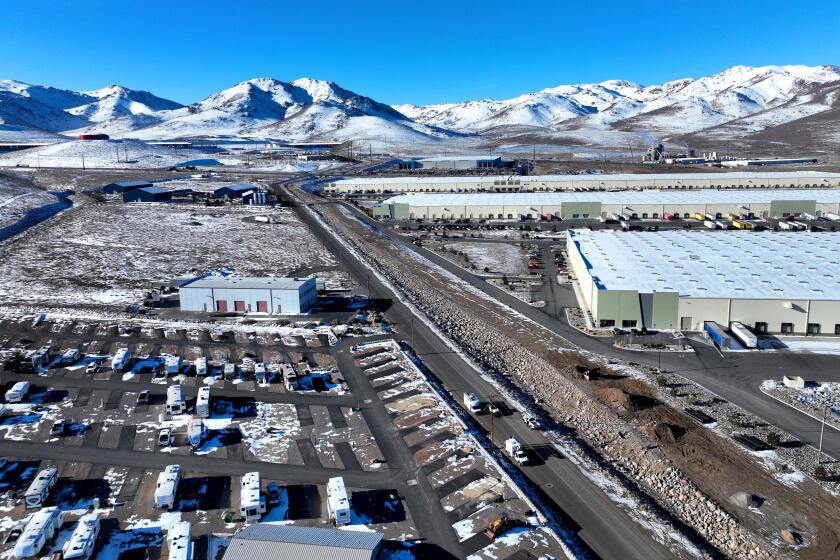More San Francisco homes selling below asking price. Could that trend come to L.A.?

- Share via
The San Francisco Bay Area has developed a famous (or infamous) reputation over the years for its housing prices, driven in part by the tech industry’s mammoth presence in the region, with cash-flush workers who could parlay stocks into down payments.
“Historically, the Bay Area has almost always had homes sell for more than asking price on average,” said Daryl Fairweather, chief economist for real estate website Redfin.com, in an interview with The Times.
But new data reveal that if not a buyer’s market, then the Bay Area is a more buyer-friendly market. Homes are, relatively, cheaper — and a similar pattern may be manifesting in Los Angeles.
The Bay Area already had notoriously high home prices when mortgage rates bottomed out during the COVID-19 pandemic, which threw gas on the fire as borrowers snapped up cheap loans.
“Sellers could just throw their house on the market,” Fairweather said, “and then a dozen buyers would show up and bid up the price of the home so the list price didn’t matter so much.”
By spring 2022, the average sale-to-list ratio, which compares the average sale price to the average list price, was over 113%.
In short, buyers were paying, on average, 113% of the listed price of a home.
But now a changing economic climate and disruptions in the tech industry have cooled the housing market; in December, San Francisco’s sale-to-list ratio dropped to 99.8%, indicating that more buyers were beginning to pay below the asking price.
It was the first time that San Francisco’s sale-to-list ratio had dipped below 100% in Redfin’s data set, which began in 2017.
The trend seems to have hit Los Angeles as well but at a smaller scale since prices never jumped as high as they did in San Francisco.
“Los Angeles was just a little bit more tempered compared to the Bay Area,” Fairweather said.
Numerous homes that underwent remediation have been left with lead concentrations in excess of state health standards, according to USC researchers.
In Los Angeles, the sale-to-list ratio peaked at 105% in April. That has fallen to 98.5%, Fairweather said. The last time the ratio was that low in L.A. was January 2019, according to the Redfin data.
Multiple factors have led to this development in the housing market: higher interest rates, layoffs in the tech sector and greener (read: less expensive) pastures elsewhere.
“Now the interest rates are high and people can leave the Bay Area for other parts of the country,” Fairweather said. “Demand has significantly slowed down, and now homes are getting zero or one offer, and sellers have to accept bids that are less than listing price.”
In addition to the higher mortgage interest rates, which are hovering at about 6% compared with 2% a few years ago, the tech sector’s latest constrictions are also playing a role, especially in the Bay Area.
“When the tech sector was booming, many buyers were able to take their restricted stock and turn that into a down payment,” Fairweather said, “and that just isn’t as available anymore now that stock values have gone down.”
Many tech giants such as Salesforce, Google and Yahoo have hemorrhaged thousands of jobs in recent weeks.
Additionally, the availability of remote work, although waning, has sent buyers to other markets, including Sacramento, San Diego and Phoenix, where homes are more affordable.
Californians moving to Nevada hope to re-create a California lifestyle — a tech hub with mountain views — without the Golden State’s problems. It’s not working exactly as planned.
All these factors have fostered an environment in which buyers can potentially buy a home in San Francisco for less than they could have last year.
That doesn’t mean homes will be cheap; they may still cost as much as they did in 2021, before prices really got out of control, but they might be less expensive.
However, buyers may not be able to benefit from a potentially lower price tag considering the current state of mortgage interest rates.
And sellers will need to “reset their expectations,” Fairweather said.
“I think it was hard for some sellers who were comparing home values to what they were in early spring of last year,” he said. “They’re not going to get that much money.”
Some sellers could be discouraged from listing their homes.
“I think the entire country is going through a slow housing market right now and as soon as [interest] rates come down, buyers are going to come off the sidelines,” Fairweather said.
More to Read
Sign up for Essential California
The most important California stories and recommendations in your inbox every morning.
You may occasionally receive promotional content from the Los Angeles Times.














